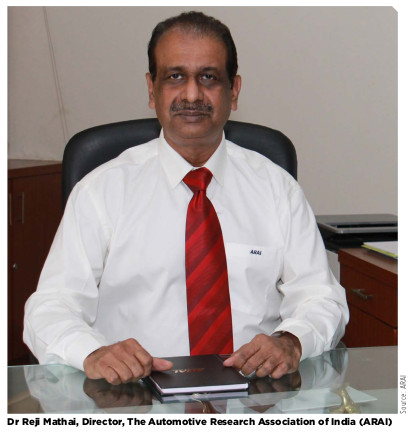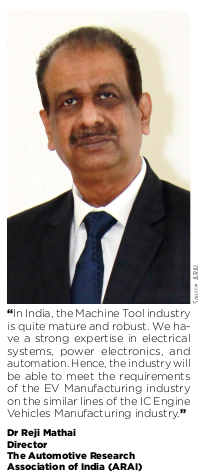Steering the Ship

In the following insightful conversation with MMI’s Editor-in-Chief Soumi Mitra, Dr Reji Mathai, Director, ARAI, talks on the institute’s focus, the expected rise in the demand of EVs, India as a hot bed of opportunities for global OEMs, and a lot more…
Please help our readers understand ARAI’s role in the current rapidly transforming automotive scenario.
Dr Reji Mathai: The Automotive Research Association of India (ARAI) is a premier research, testing and certification institute of the Automotive industry, affiliated to Ministry of Heavy Industries, Government of India. ARAI works on future technology development, regulation roadmap and provides policy inputs to the Government of India with the objective of protection of environment, sustainable transportation and road safety. With more than five decades of service to the Indian Auto industry and the nation, ARAI strives hard for development and growth of environment-friendly and safer vehicles on the road. The institute tracks international technological developments and works on developing India specific solutions, including India-specific regulations.
Nomura Research Institute Consulting & Solutions India has predicted a stronger growth of the Indian Auto industry in 2021-22, with electric vehicle sales, especially two-wheelers, also likely to see positive movement. What is your view on the same?
As we adapt to the new normal of Covid-19 pandemic, Indian Auto industry is expected to grow in an accelerated way as predicted by global experts. With the announcement of PLI scheme by the Indian Government, the FAME II scheme and state EV policies, the adoption of electric vehicles (EVs) by Indian consumers is expected to rise. The current fuel prices are also driving consumers to consider EVs as an option. The Auto industry and various startups are working on the development of new EV models and we are observing new players coming in the market, especially in the electric two-wheeler segment. As India is predominantly two-wheeler transportation market, rise in the sales of electric two-wheelers is naturally expected.
With the announcement of Tesla’s entry by the Union Minister Nitin Gadkari and the electric push given by his ministry, there is a general buzz around electric cars in India. Hence, 2021 is slated to be the year of electric cars in India.
Global OEMs see India as an opportunity to expand their businesses and, with favorable policies, we can see excellent growth in this sector. Long-term roadmap of government policies for EVs will be an enabler for manufacturers to set up base in India. The well-planned roadmap will also provide tier I and II suppliers to scale up the capacities. The need is to collaborate to achieve economies of scale. Hence, the future in this sector is going to be exciting.
The Indian Automotive industry is based on conventional engines. For the large-scale adoption of electric vehicles, the entire ecosystem has to be transformed. How is ARAI helping the industry to smoothly transition this change especially that ARAI has set up a Centre of Excellence for electric mobility for the handholding of the vehicle manufacturers, component manufacturers, tier I and II suppliers. Kindly elaborate on this.
A RAI, with the support of the Department of Heavy Industry, has set up a dedicated test center at its Chakan campus, keeping in view the need faced by the Auto industry on the developmental front, testing and certifications of EVs and their components such as motors, batteries, chargers, etc. This center is operational for the last two years and is providing services to the industries that are in the development of the entire gamut of EVs - from 2-wheelers to buses. For a smooth transition to electric mobility, the ARAI Academy is focused on skill development and conducts domain training programs, specialized PG diploma courses, etc.
RAI, with the support of the Department of Heavy Industry, has set up a dedicated test center at its Chakan campus, keeping in view the need faced by the Auto industry on the developmental front, testing and certifications of EVs and their components such as motors, batteries, chargers, etc. This center is operational for the last two years and is providing services to the industries that are in the development of the entire gamut of EVs - from 2-wheelers to buses. For a smooth transition to electric mobility, the ARAI Academy is focused on skill development and conducts domain training programs, specialized PG diploma courses, etc.
ARAI has also been helping startups in the EV space. How is that done?
The Government of India’s ‘Startup India’ campaign has led to the growth of the startup ecosystem in the country. Various startups are venturing into the Automotive sector, particularly in the electric mobility domain. Apart from providing development and testing services, ARAI has been going an extra mile to handhold startups in the technology development, understanding of regulations, homologation process, etc.
Kindly apprise us of the role of TechNovuus and how it contributes to help the Auto sector?
TechNovuus is an online platform developed by ARAI to bring all the stakeholders such as vehicle manufacturers, components manufacturers, startups, R&D institutes, academia, and students on the same platform to address the technological problems faced by the industry. This platform is developed under the guidance and support of the Department of Heavy Industry of Government of India. The stakeholders registered on this platform can post their challenges/problems and the expert community, with the support of the startups, R&D institutes, and academia, can work on solving those. TechNovuus platform will go a long way in the development and growth of technological innovations in the Auto sector.
Ensuring battery safety in EVs is one of the key challenges. What are the standards and test procedures developed that suit the Indian environmental conditions?
Battery safety is of paramount importance in EVs. Hence, in India too, the Automotive industry standards are formulated in line with the latest technological developments and challenges, international harmonized standards, and India-specific conditions. For example, AIS 038 Rev-2 for passenger cars and commercial vehicles and AIS 156 for two-wheelers and three-wheelers have been formulated, which comprehensively include battery safety in EVs.
The Government of India’s ‘Startup India’ campaign has led to the growth of the startup
ecosystem in the country. Various startups are venturing into the Automotive sector, particularly in the electric mobility domain.
It is being strongly felt that the Government should incentivize both manufacturers and consumers to shift to EVs since a supporting infrastructure is needed for their widespread adoption. Please share your take on the same.
Presently, the Government of India is implementing Phase 2 of FAME India scheme, which provides incentives to the buyers of EVs. Thus, it is a demand side incentive. The Government is also working on production link incentives (PLI) scheme, which will provide supplier side incentive also. The details of PLI scheme are still awaited.
Do you think the Indian machine tool manufacturers are enough equipped with skill, knowhow, and infrastructure to cater to the requirements of the EV manufacturing industry?
In India, the Machine Tool industry is quite mature and robust. We have a strong expertise in electrical systems, power electronics, and automation. Hence, the industry will be able to meet the requirements of the EV Manufacturing industry on the similar lines of the IC Engine Vehicles Manufacturing industry.

SOUMI MITRA
Editor-in-Chief
Modern Manufacturing India
soumi.mitra@magicwandmedia.in



 Facebook
Facebook.png) Twitter
Twitter Linkedin
Linkedin Subscribe
Subscribe